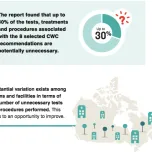Choosing Wisely (CW) is a campaign, originally from Canada but now also active the UK and US, which engages clinicians and other health professionals in debate and action to deprioritise low value and unnecessary tests and treatments.
This report and webinar have been made available by CW Canada and the Canadian Institute for Health Information. The report, Unnecessary Care in Canada, provides data on the 8 interventions that Choosing Wisely Canadian have identified as of low value to patients. The report finds that 30% of Canadian patients are undergoing tests treatments or procedures that are potentially unnecessary (potentially 1m interventions).
Whilst this is a clinician-led initiative, Choosing Wisely has a strong self-care element by encouraging the patient to ask five questions:
- Do I really need this test, treatment or procedure?
- What are the risks or downsides?
- What are the possible side effects?
- Are there simpler, safer options?
- What will happen if I do nothing?
It’s not difficult to spot that substantial financial and carbon savings stand to be made from the implementation of CW recommendations, but the benefits to patients can also be significant in avoiding potential side effects, saving time and travel costs and also by standing to benefit from the increase in resources available for other care.
One of the Canadian CW recommendations is: Don't use benzodiazepines and/or other sedative–hypnotics in older adults as a first choice for insomnia, agitation or delirium. These are currently prescribed to one in ten older Canadians but carry the risk of both drowsiness and memory side effects. During the webinar Dr. Wendy Levinson, Chair and Co-Founder of Choosing Wisely Canada says “We know from the evidence that we harm more people than we help in using these drugs in this way”.
The webinar is available here and the report here.
The UK Academy of Medical Royal Colleges’ list of 40 interventions that offer low or no value to patients is here and here.
Those interested in lean healthcare provision globally can also find an OECD report, Tackling Wasteful Spending on Health, here.

Please log in or sign up to comment.